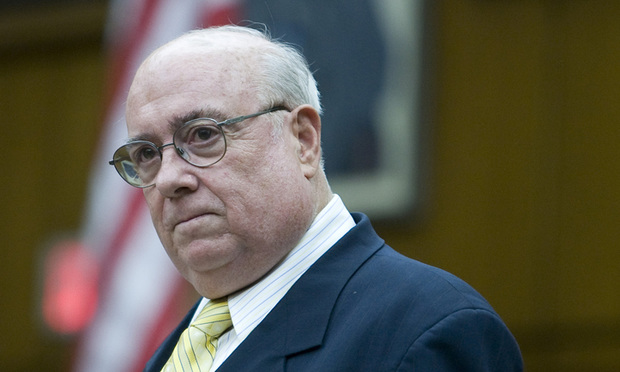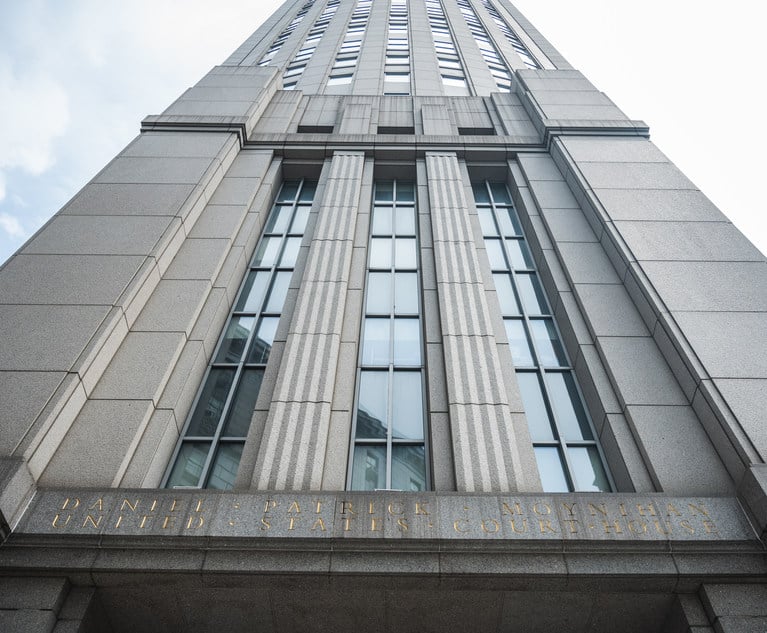Is a Coronavirus Loan Truly a 'Loan'? Federal Judge Questions Whether Lobbyists Can Tap Relief Funds
U.S. Justice Department lawyer David Morrell pointed to favorable rates and availability of forgiveness to argue that the loans are "subsidies regardless of how one looks at it."
April 20, 2020 at 05:23 PM
4 minute read
 U.S. District Judge Royce Lamberth in Washington. Credit: Diego M. Radzinschi / The NLJ
U.S. District Judge Royce Lamberth in Washington. Credit: Diego M. Radzinschi / The NLJ
Lobbyists and political consultants faced a skeptical judge Monday in Washington as they pressed for access to coronavirus relief funds, in a hearing convened over the phone as courts across the country limit their operations amid the ongoing global health crisis.
The telephonic hearing before U.S. District Judge Royce Lamberth came a week after the American Association of Political Consultants sued for access to a nearly $350 billion federal loan program designed to help small businesses upended by the coronavirus outbreak.
In its lawsuit, the trade association argued the Trump administration had violated the free speech rights of political consultants in barring them from the Paycheck Protection Program, or PPP, which was authorized as part of the roughly $2 trillion coronavirus relief package.
Within days, the Justice Department answered that the federal government cannot be compelled to "subsidize" lobbying and other speech.
At Monday's hearing, Lamberth questioned the trade group about whether the loans amounted to the kind of subsidy that has long been off-limits to lobbyists and other political consultants.
Noting the favorable rates and other "unusual" terms, Lamberth asked for the "best argument" for why a loan through the Payroll Protection Program should not be seen as a subsidy.
"Your honor, it's not a subsidiary because [the relief is] still a loan," said Jason Torchinsky, a partner at Holtzman Vogel Josefiak Torchinsky, a Virginia firm representing the trade group. "You still have to go to a bank, you still have to submit an application, you still owe the bank interest on that money."
"When it looks like a loan and acts like a loan, it's a loan," he added.
"Well, that's not totally accurate," Lamberth replied, "because they're also saying most if not all of the loans are going to be forgiven, right?"
Torchinsky said the extent of loan forgiveness available under the program remains unclear, adding that, for small businesses, there is "no guarantee" of receiving such relief.
On Monday, Justice Department attorney David Morrell pointed to the favorable rates and availability of forgiveness to argue that the loans are "subsidies regardless of how one looks at it."
"For one thing, the availability of forgiveness of the loan transforms these into a subsidy," said Morrell, a top political appointee in the Justice Department's civil division.
"The delta between market terms and the terms of these loans is exactly the kind of economic benefit that transforms these into subsidies," he added.
Monday's arguments came just days after the PPP, a hallmark of the Trump administration's coronavirus stimulus, was fully tapped. During an appearance Sunday on CNN, Treasury Secretary Steven Mnuchin said the Trump administration was closing in on a deal with Democratic leaders to authorize more loans for small businesses upended by the coronavirus outbreak.
"I think we're very close to a deal today. I'm hopeful that we can get that done," Mnuchin said.
The deal under negotiation would inject another $370 billion into the small business relief program.
Lamberth said he hopes to issue a ruling Tuesday.
Read more:
Cozen's Biz Van Gelder Has Made Some Discoveries in the Coronavirus Era
'It's Just Been Unreal': Catching Up With Wilmer Hale's Jamie Gorelick
'Unprecedented Need for Information': Inside Lobbying Frenzy Over Covid-19 Stimulus
New Normal Sets In for White-Collar Lawyers in the Virus Era
'It's Going to Be Extraordinary': Predictions From Neil Barofsky for Coronavirus Oversight
This content has been archived. It is available through our partners, LexisNexis® and Bloomberg Law.
To view this content, please continue to their sites.
Not a Lexis Subscriber?
Subscribe Now
Not a Bloomberg Law Subscriber?
Subscribe Now
NOT FOR REPRINT
© 2025 ALM Global, LLC, All Rights Reserved. Request academic re-use from www.copyright.com. All other uses, submit a request to [email protected]. For more information visit Asset & Logo Licensing.
You Might Like
View All
Financial Services Has a Trust Problem. Can GCs Help Right the Ship?

Nasdaq-Traded Blockchain Company Countersues Financer Over 'Toxic Lending Practices'
4 minute read
DOJ's Visa Antitrust Suit Hands Class Action Lawyers New Line of Attack Against Payments Giant
Law Firms Mentioned
Trending Stories
- 1Parties’ Reservation of Rights Defeats Attempt to Enforce Settlement in Principle
- 2ACC CLO Survey Waves Warning Flags for Boards
- 3States Accuse Trump of Thwarting Court's Funding Restoration Order
- 4Microsoft Becomes Latest Tech Company to Face Claims of Stealing Marketing Commissions From Influencers
- 5Coral Gables Attorney Busted for Stalking Lawyer
Who Got The Work
J. Brugh Lower of Gibbons has entered an appearance for industrial equipment supplier Devco Corporation in a pending trademark infringement lawsuit. The suit, accusing the defendant of selling knock-off Graco products, was filed Dec. 18 in New Jersey District Court by Rivkin Radler on behalf of Graco Inc. and Graco Minnesota. The case, assigned to U.S. District Judge Zahid N. Quraishi, is 3:24-cv-11294, Graco Inc. et al v. Devco Corporation.
Who Got The Work
Rebecca Maller-Stein and Kent A. Yalowitz of Arnold & Porter Kaye Scholer have entered their appearances for Hanaco Venture Capital and its executives, Lior Prosor and David Frankel, in a pending securities lawsuit. The action, filed on Dec. 24 in New York Southern District Court by Zell, Aron & Co. on behalf of Goldeneye Advisors, accuses the defendants of negligently and fraudulently managing the plaintiff's $1 million investment. The case, assigned to U.S. District Judge Vernon S. Broderick, is 1:24-cv-09918, Goldeneye Advisors, LLC v. Hanaco Venture Capital, Ltd. et al.
Who Got The Work
Attorneys from A&O Shearman has stepped in as defense counsel for Toronto-Dominion Bank and other defendants in a pending securities class action. The suit, filed Dec. 11 in New York Southern District Court by Bleichmar Fonti & Auld, accuses the defendants of concealing the bank's 'pervasive' deficiencies in regards to its compliance with the Bank Secrecy Act and the quality of its anti-money laundering controls. The case, assigned to U.S. District Judge Arun Subramanian, is 1:24-cv-09445, Gonzalez v. The Toronto-Dominion Bank et al.
Who Got The Work
Crown Castle International, a Pennsylvania company providing shared communications infrastructure, has turned to Luke D. Wolf of Gordon Rees Scully Mansukhani to fend off a pending breach-of-contract lawsuit. The court action, filed Nov. 25 in Michigan Eastern District Court by Hooper Hathaway PC on behalf of The Town Residences LLC, accuses Crown Castle of failing to transfer approximately $30,000 in utility payments from T-Mobile in breach of a roof-top lease and assignment agreement. The case, assigned to U.S. District Judge Susan K. Declercq, is 2:24-cv-13131, The Town Residences LLC v. T-Mobile US, Inc. et al.
Who Got The Work
Wilfred P. Coronato and Daniel M. Schwartz of McCarter & English have stepped in as defense counsel to Electrolux Home Products Inc. in a pending product liability lawsuit. The court action, filed Nov. 26 in New York Eastern District Court by Poulos Lopiccolo PC and Nagel Rice LLP on behalf of David Stern, alleges that the defendant's refrigerators’ drawers and shelving repeatedly break and fall apart within months after purchase. The case, assigned to U.S. District Judge Joan M. Azrack, is 2:24-cv-08204, Stern v. Electrolux Home Products, Inc.
Featured Firms
Law Offices of Gary Martin Hays & Associates, P.C.
(470) 294-1674
Law Offices of Mark E. Salomone
(857) 444-6468
Smith & Hassler
(713) 739-1250









